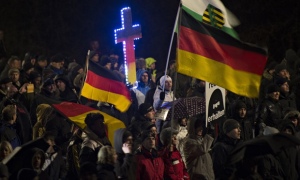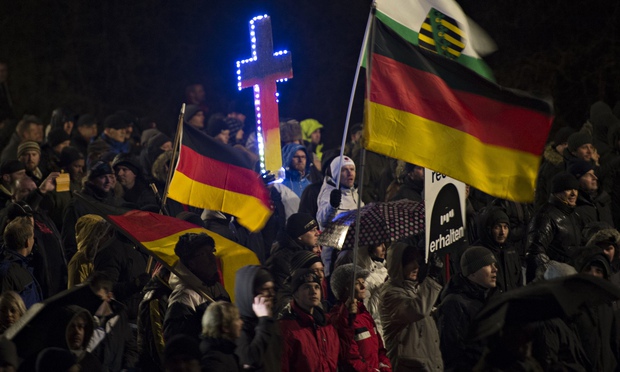
The right-wing protest movement Patriotic Europeans against the Islamization of the occident (PEGIDA) has provoked a broad discussion within German public on issues such as racism, refugees, Muslim immigrants and fatigue. Approximately 15.000 people have been joining the Monday marches, which take place every Monday in the city of Dresden, in East Germany. Other PEGIDA branches have initiated marches in cities in North-Rhine Westphalia, such as Bonn and Düsseldorf, in order to broaden the range of the movement.
The movement claims to march across Germany against the “Islamization” and “illegal” immigrants, who are said to exploit the German economy and to free ride the social welfare system of the Federal Republic.
A significant number of PEGIDA´s protestors are mainstream Germans coming from each socio-economic and political scale of society. However, some of the leading members and organizers of PEGIDA belong to the extreme right-wing movement, are active Neo-Nazis and possess criminal records.
According to a YouGov public opinion poll conducted between December 16 and December 18 2014, 49% of all Germans show understanding for the demonstrations of PEGIDA. While 30% of Germans show full understanding for the protests, 19% do partly agree with the claims of PEGIDA and 23% reject the protests. PEGIDA´s protest issues are accepted by 73% of Germans, which raise their concerns about the spread of Islam in Germany. The feeling of phobia (Angst, in German) towards refugee flows is highly recognizable when asking about the number of asylum seekers. Approximately 59% of Germans agree with the statement that Germany accepts “too many” refugees, while 30% disagree with the refugee policy of the German State accepting “clearly too many” refugees.
Representatives of the government, while condemning the protests, showed some propensity for dialogue and understanding. The former president of the German Federal parliament Wolfgang Thierse spoke in favor of dialogue with PEGIDA. “Politics needs better explanation”, he added. He continued by stating the need for politicians to explain the necessity of immigration. While one should confront Neo-Nazis, he said, he should also avoid to criminalize tens of thousands of citizens. According to Mt. Thierse, this answer is too simple as displacement, denationalization and fears (Angst) of people caused by Islamist terror require attention by politicians.
In the same line, the Christian Democratic Federal Minister of Interior, Thomas de Maizière (CDU), showed concern but also understanding for the issues of the demonstrators of PEGIDA. The speaker of the Federal government Steffen Seibert also condemned any kind of racism and hatred against religious or ethnic minorities. However, he said, one needs to consider all aspects of immigration, informing “concerned citizens”, whether Germany is able to handle everything.
A very different position is that of the chief of the left socialist party (Die Linke), Bernd Riexinger. He declared that such comments by the government lead to the 1990s, a period which marked the climax of xenophobic attacks and fire assaults against immigrants and refugees. According to Riexinger, established parties allow racism to become socially acceptable and thus help creating a political climate that encourages violent right-wing gangs.
Critical comments came also from the chief of the Green party (Grüne), Cem Özdemir, who asked all democratic parties to draw clear lines between themselves and PEGIDA. The secretary of the refugee organization Pro Asyl, Günter Burkhardt, warned not to underestimate the right-wing movement, as PEGIDA questions basic rights such as religious freedom and asylum. According to Burkhardt, the goal of the movement is to establish racism within the political discourse and diffusing resentment, by presenting them as “democratic expression of freedom”. If politicians and the public showed understanding and trivialize these protests as expressions of diffuse “Angst”, the strategy of PEGIDA would succeed. Even more strongly, the Social Democratic Federal Minister of Judiciary, Heiko Maas (SPD) described the Monday marches as a “shame for Germany”. The chair of the central council of Jews, Josef Schuster defined PEGIDA as dangerous.
In an interview, Cem Özdemir complained about the reactions of mainstream parties to the success of the right-wing in Germany. The main parties, he says, adapt to the issues that caused the relative success of the new right-wing party “Alternative for Germany” (AFD) and PEGIDA and therefore drift to the political right. Proposals initiated by the “Christian Social Party” (CSU) demanding immigrants to speak German at home would strengthen, in his opinion, the perception of PEGIDA and AFD adherents to be representatives of a “silent majority”. Parties were blamed also by the chair of the council of Muslims, Aiman Mazyek. He declared that parties as partly responsible for the Anti-Islam demonstrations. In this opinion, there is a lack of communication and dialogue between politicians and people. PEGIDA, according to Mazyek, symptomizes the fear of people towards the future: people fearing of losing their jobs are searching for scapegoats. PEGIDA leaders, he concludes, are doing nothing but exploiting the fear of people.






